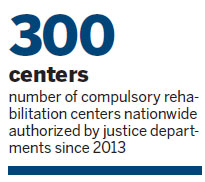Drug treatment centers finding success
By Zhang Yan (China Daily) Updated: 2014-09-09 07:08More than 600,000 drug addicts underwent compulsory detox in rehabilitation centers between 2011 and the end of June, and 30 percent of them have overcome their addiction, the Ministry of Justice said.
More than 200,000 drug addicts are receiving treatment in the centers run by local justice departments, according to the ministry, including 5,000 who took drugs again after being discharged.
"It's easy for their bodies to get rid of the drug, but it's more difficult for them to get off the drugs psychologically," said a senior ministry official who declined to be named, adding that 70 percent of users take drugs again after they are rehabilitated and discharged.
In 2013, the central government abolished the re-education through labor system and the ministry's narcotics detoxification management bureau was established. More than 300 compulsory rehabilitation centers authorized by justice departments have been set up nationwide.
The official said that in recent years, rehabilitation centers have increasingly invested in advanced medical devices and enhanced training for doctors to offer medical help for drug addicts. Since 2012, doctors have performed more than 1.1 million procedures to treat people under the influence of drugs.

Apart from improving physical rehabilitation training, they are paying attention to psychological treatment, and labor or vocational training to prepare them to return to society, the official said.
More than 3,300 doctors and 9,100 psychological consultants alongside 13,000 full- or part-time teachers offer psychological consultation to the addicts, the ministry said.
Judicial organs will focus on standardizing rules for the addicts to communicate with family members during their isolation, it said.
The Narcotics Detoxification Regulation was issued by the State Council in 2011, stipulating that local public security departments can arrest people struggling with serious drug addiction and place them in rehabilitation centers for compulsory narcotics detoxification.
After three to six months, they are transferred to the rehabilitation centers under local justice departments to continue treatment. Usually, the isolation period will last for two years.
"After separating the functions, police officers will focus on attacking the crimes to maintain social stability, and through accumulating practical experiences, justice officers will effectively use the resources and offer targeted treatment to the drug addicts," said Liu Wenren, a law professor from the Chinese Academy of Social Sciences.
zhangyan1@chinadaily.com.cn
- Govt encourages people to work 4.5 days a week
- Action to be taken as HIV cases among students rise
- Debate grows over reproductive rights
- Country's first bishop ordained in 3 years
- China builds Tibetan Buddhism academy in Chengdu
- Authorities require reporting of HIV infections at schools
- Typhoon Soudelor kills 14 in East China
- Police crack down on overseas gambling site
- Debate over death penalty for child traffickers goes on
- Beijing to tighten mail security for war anniversary







